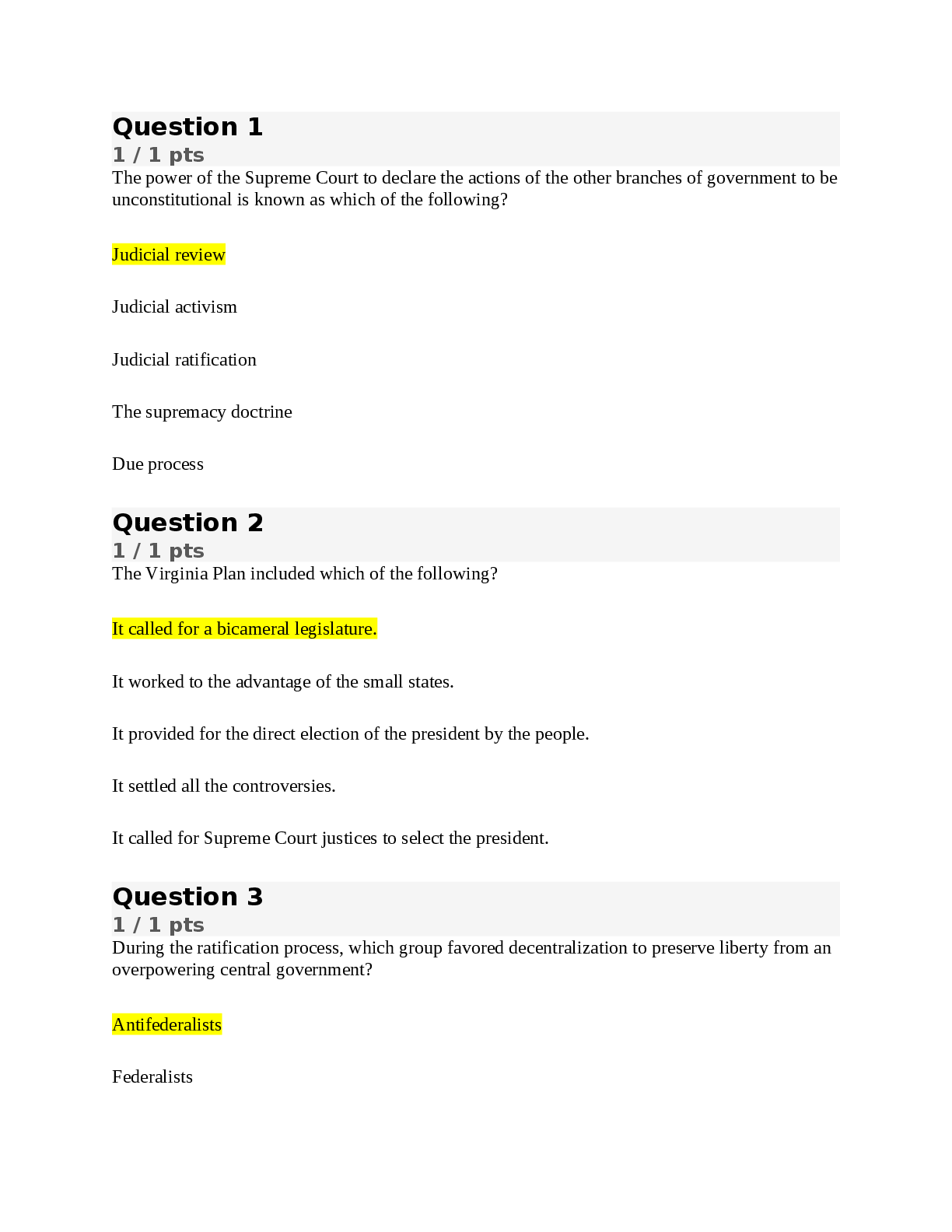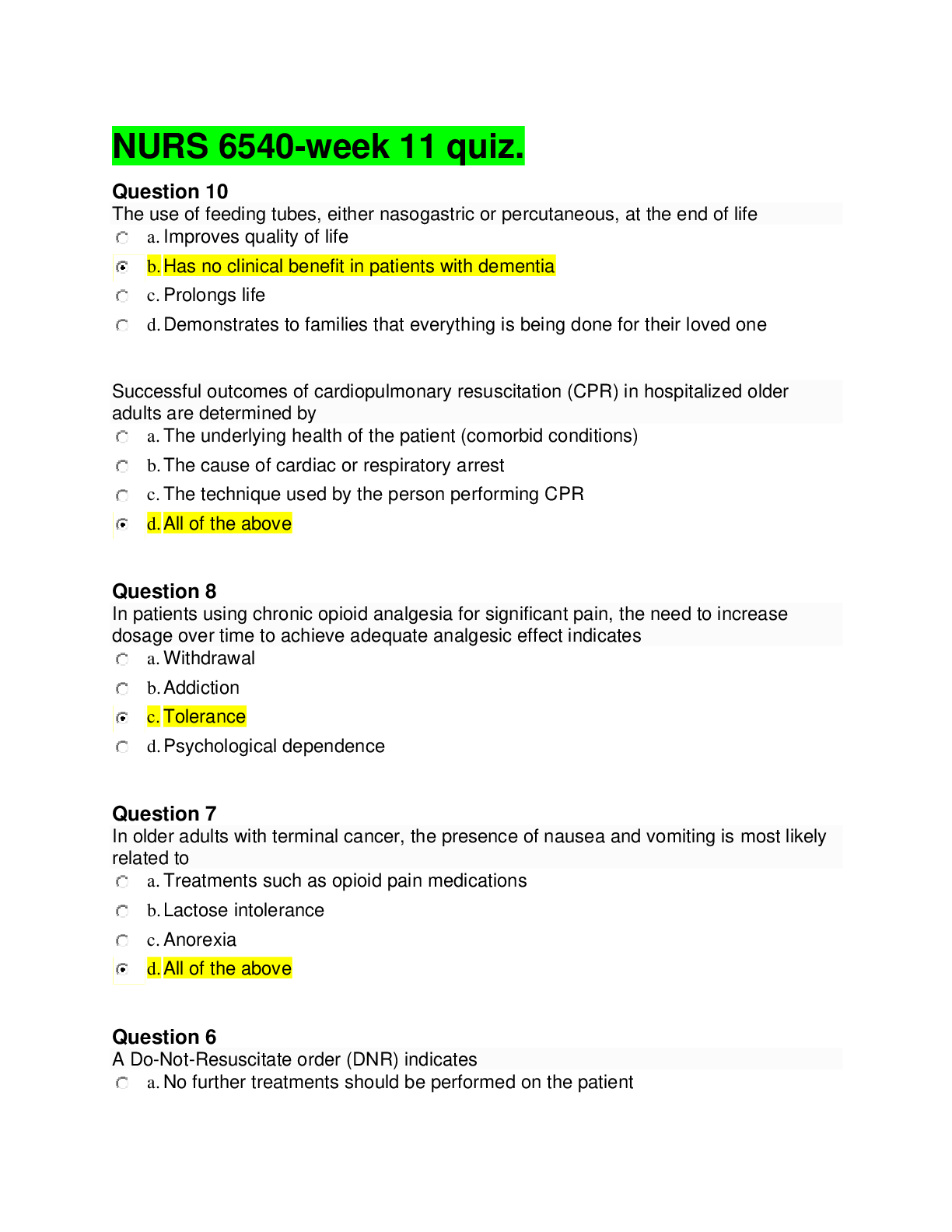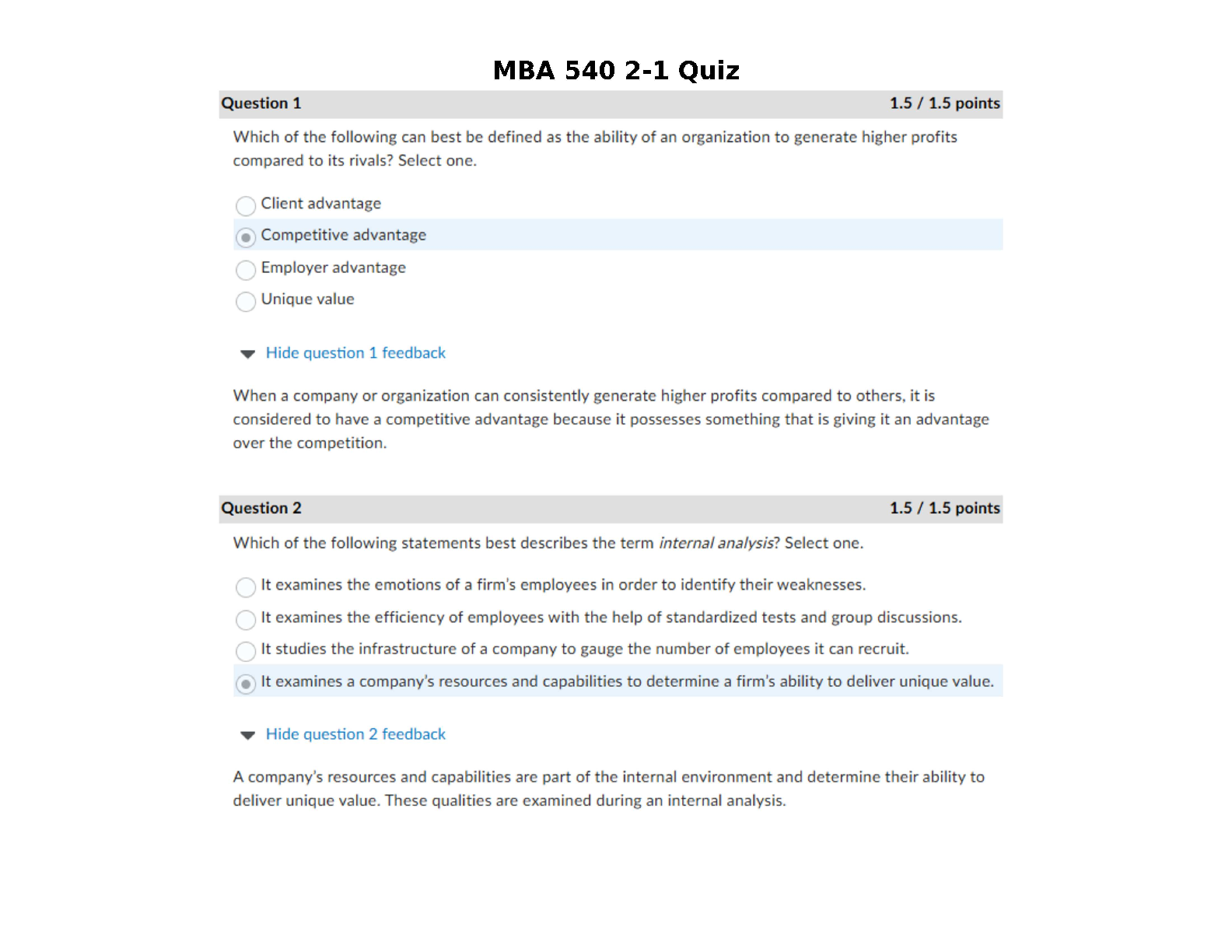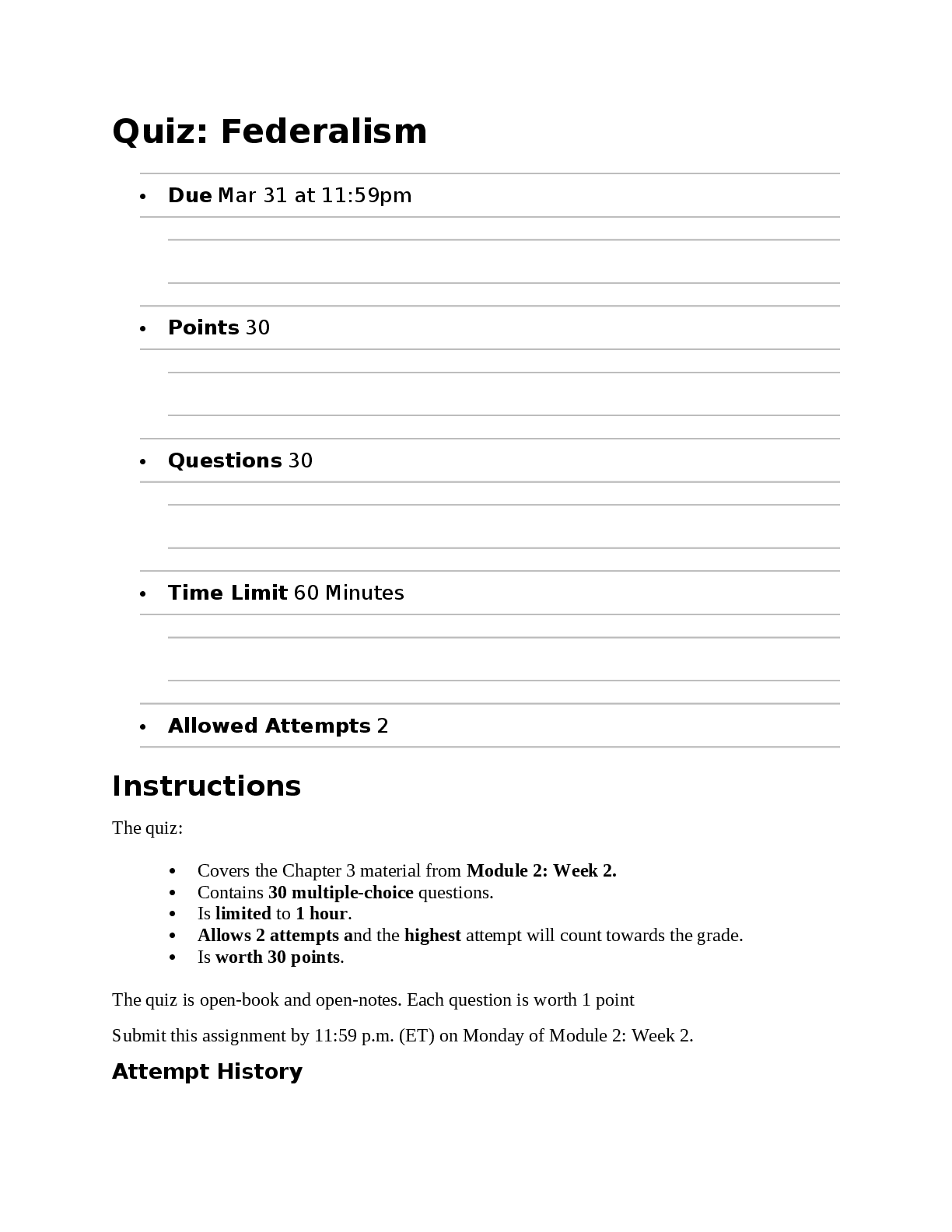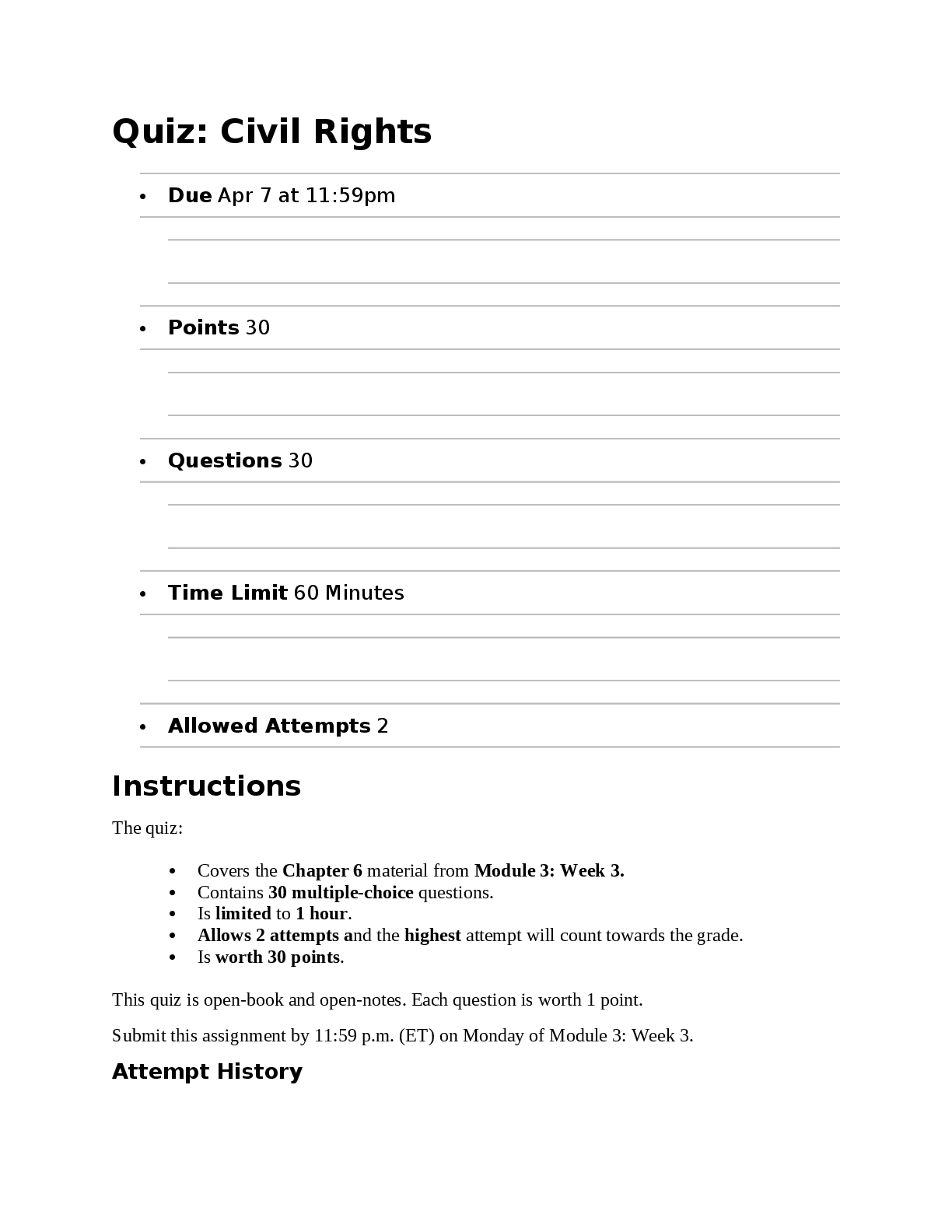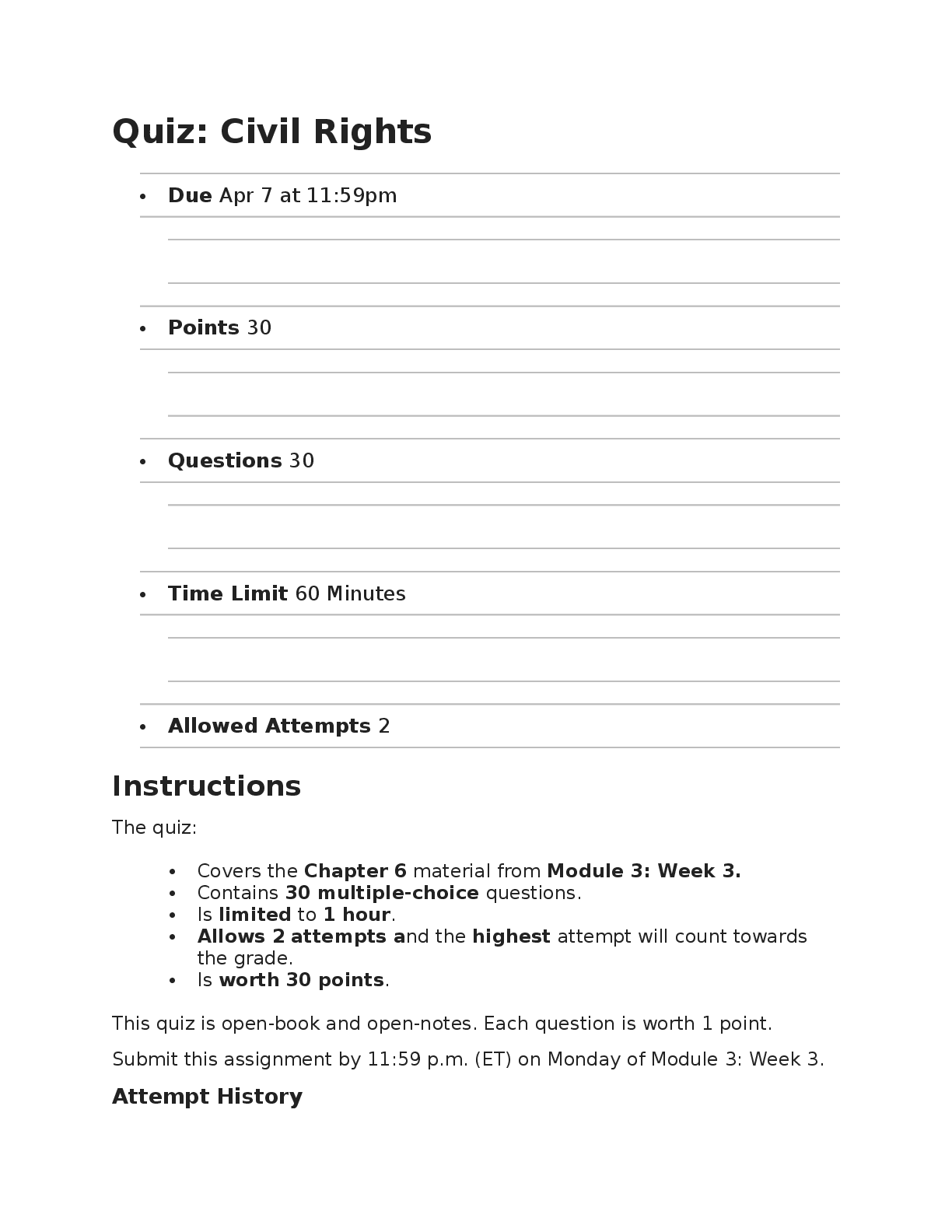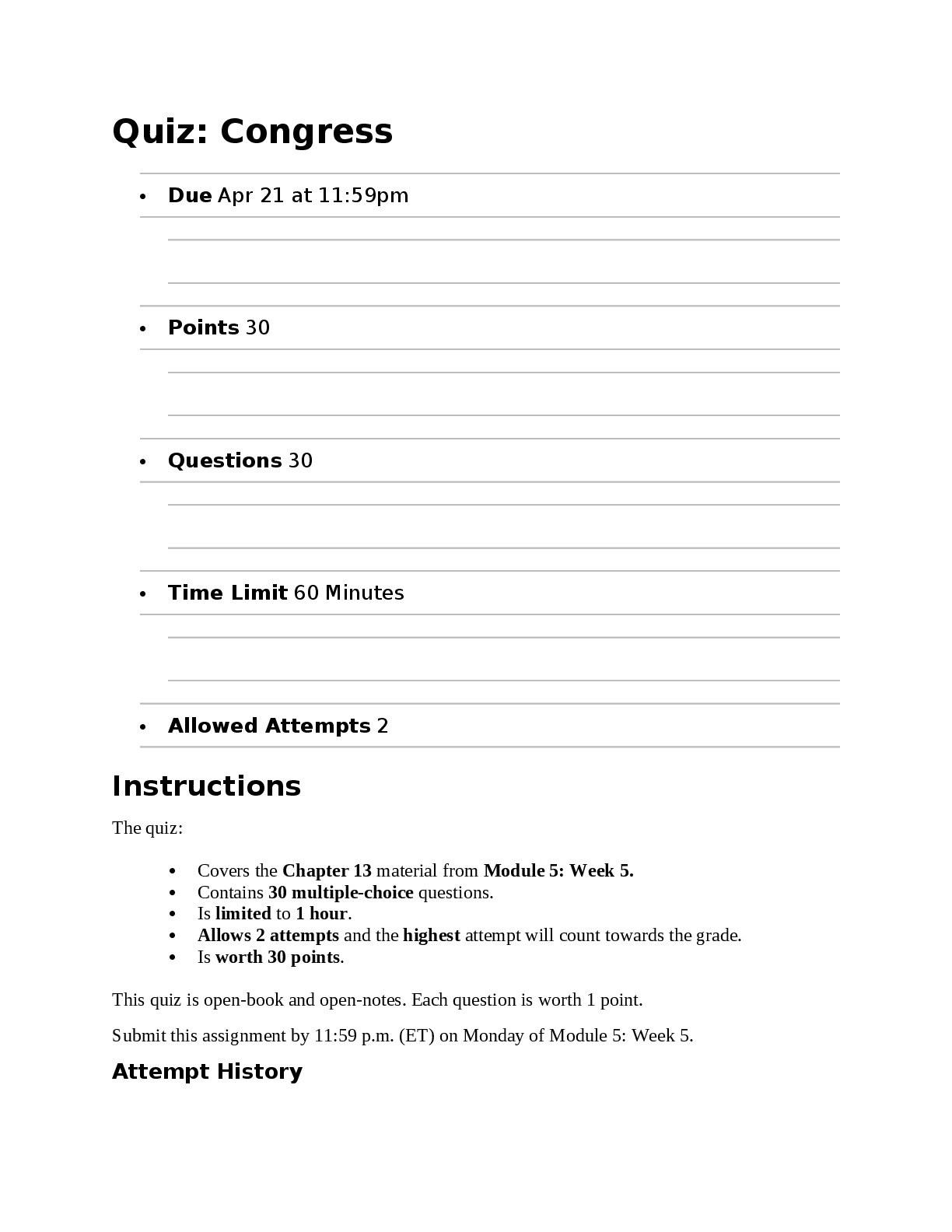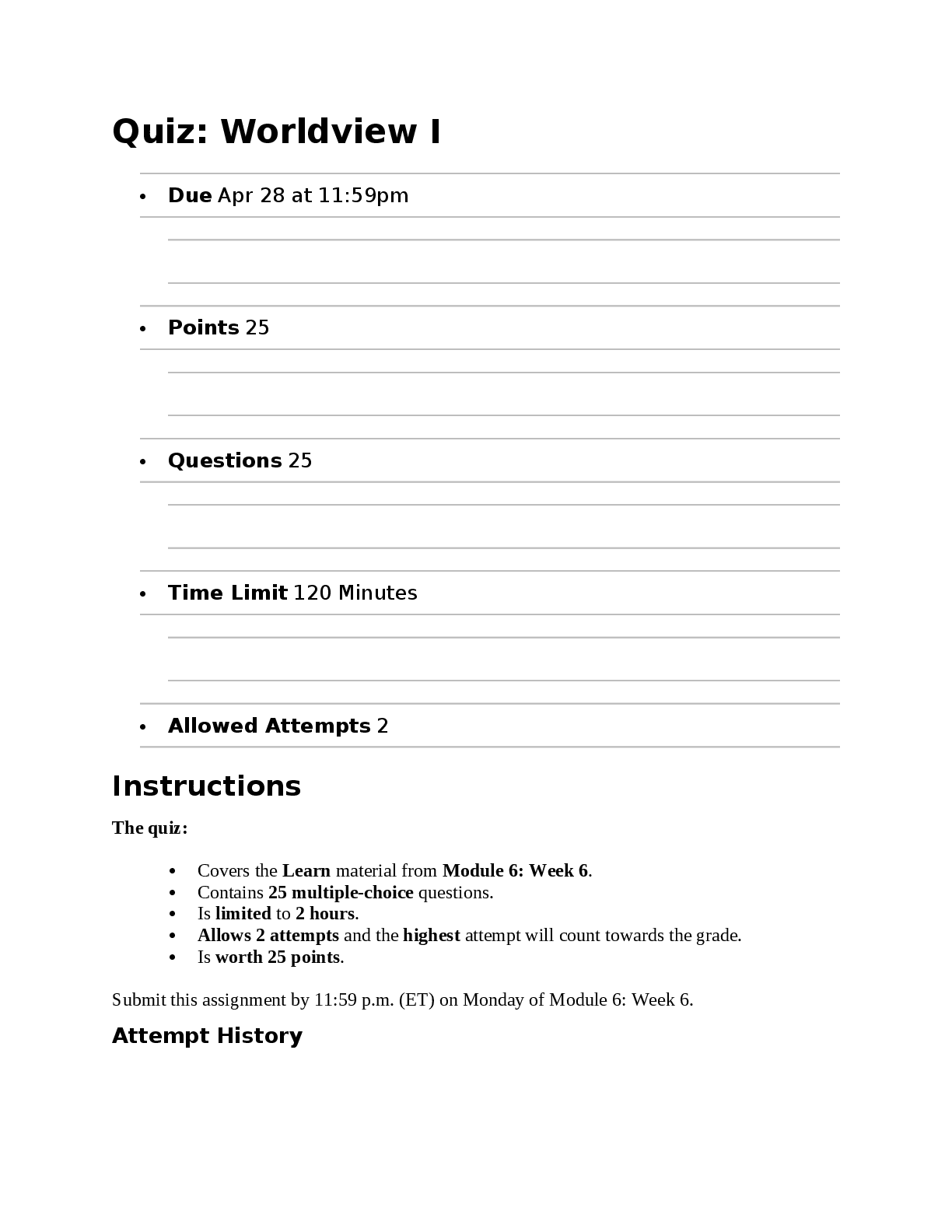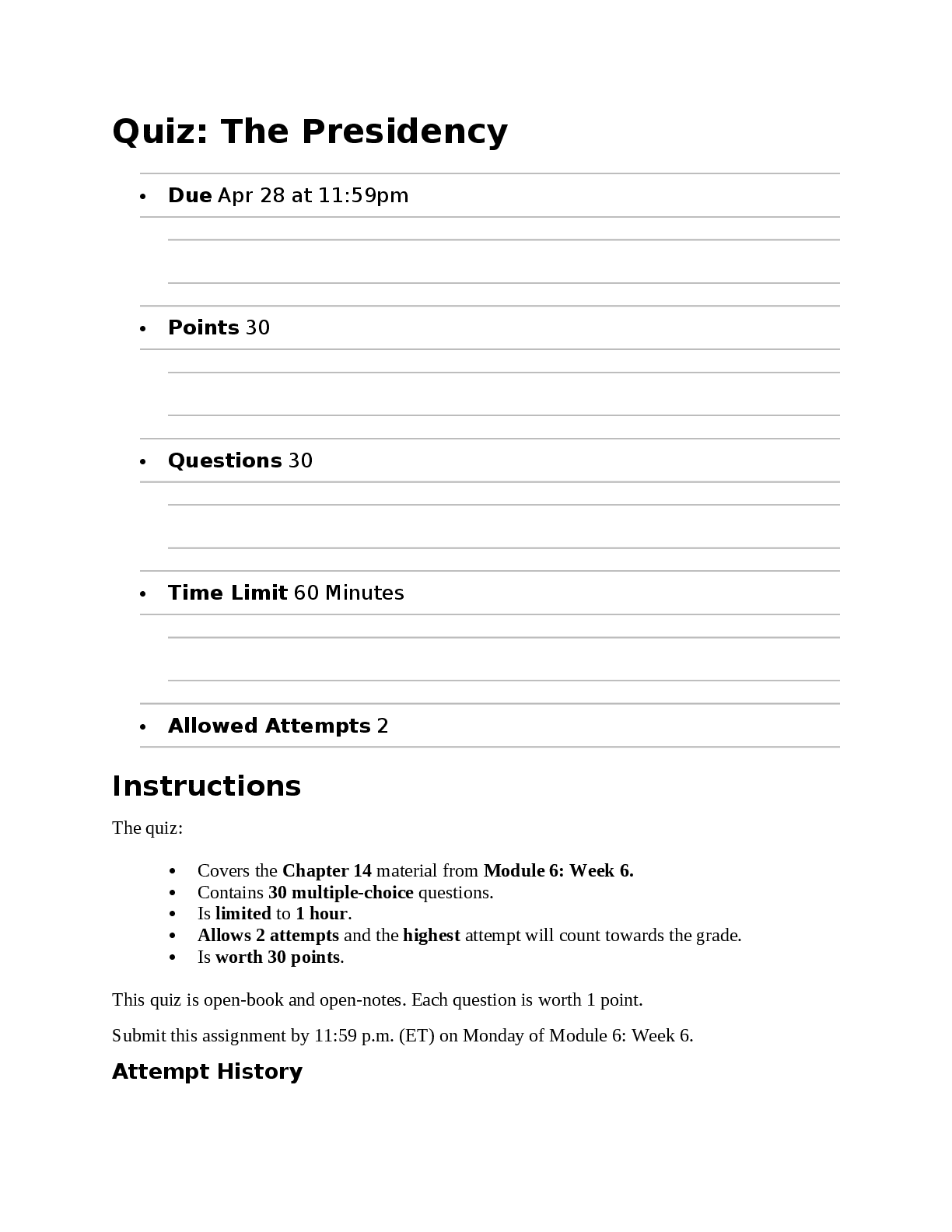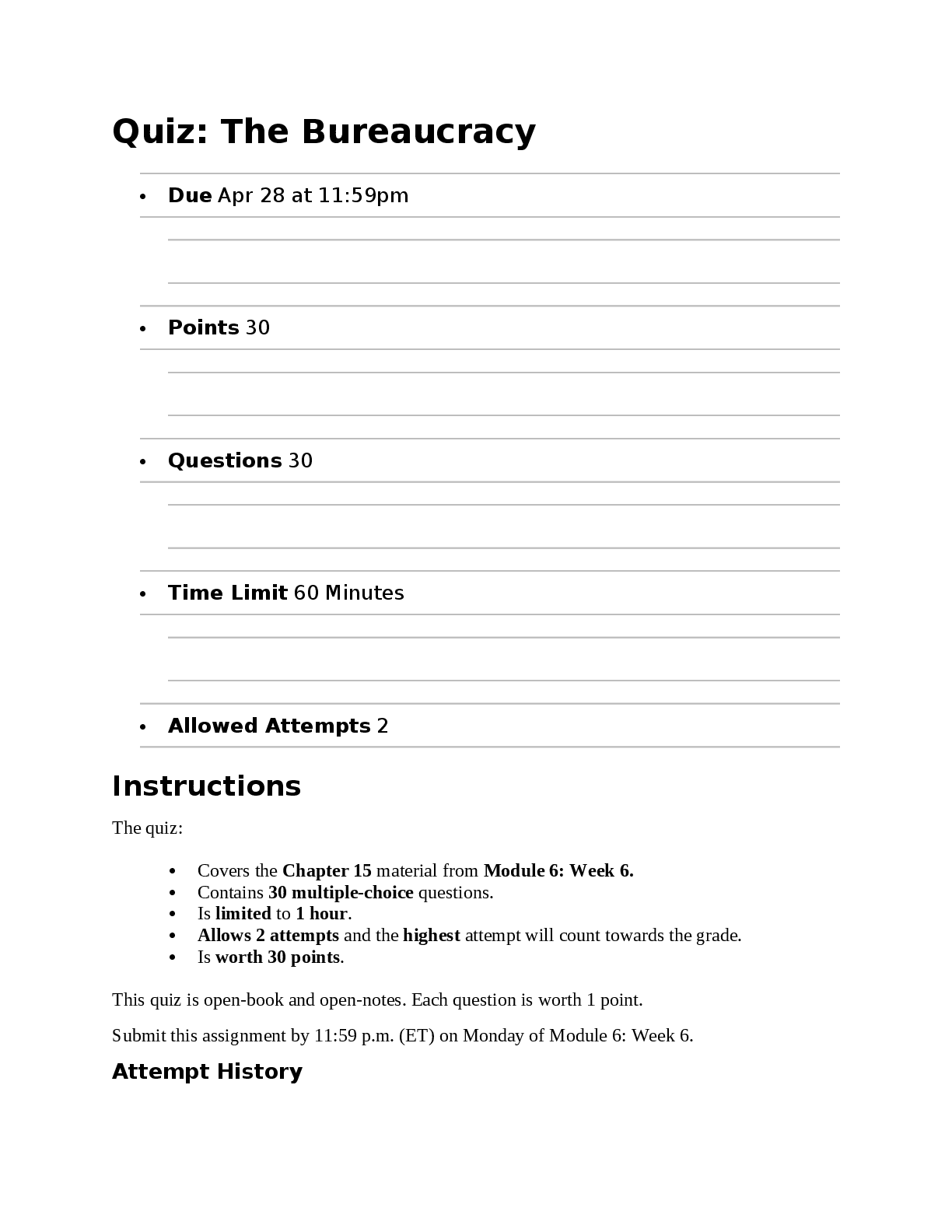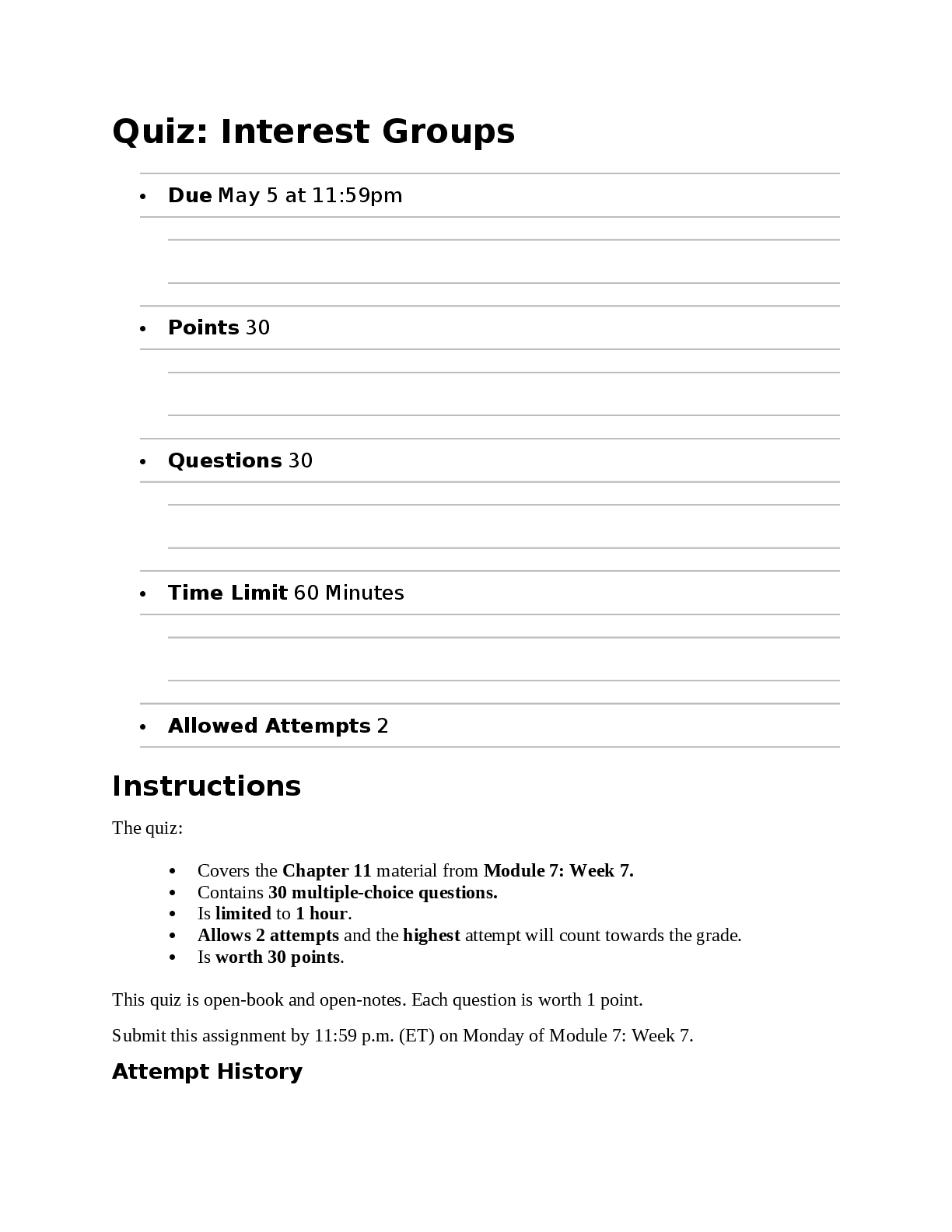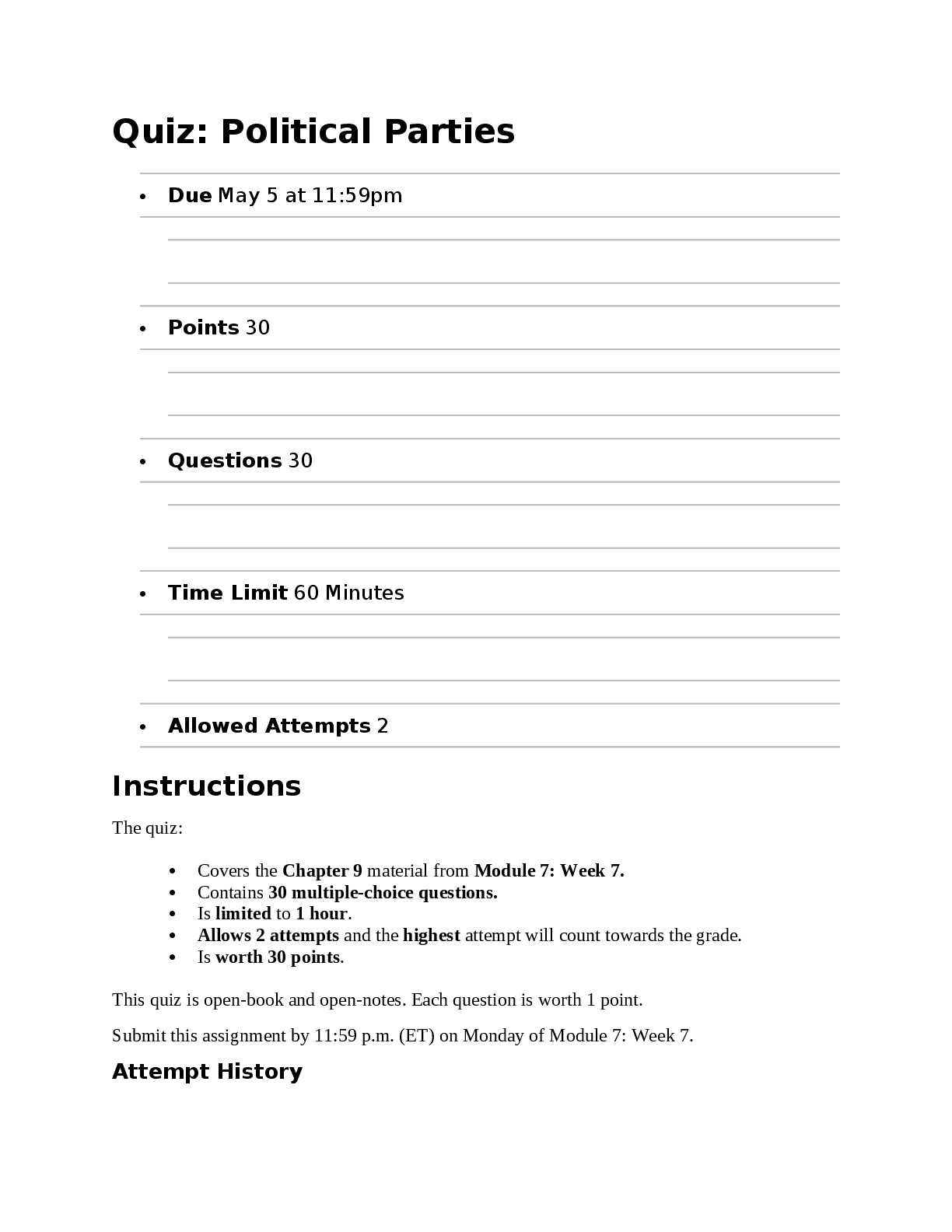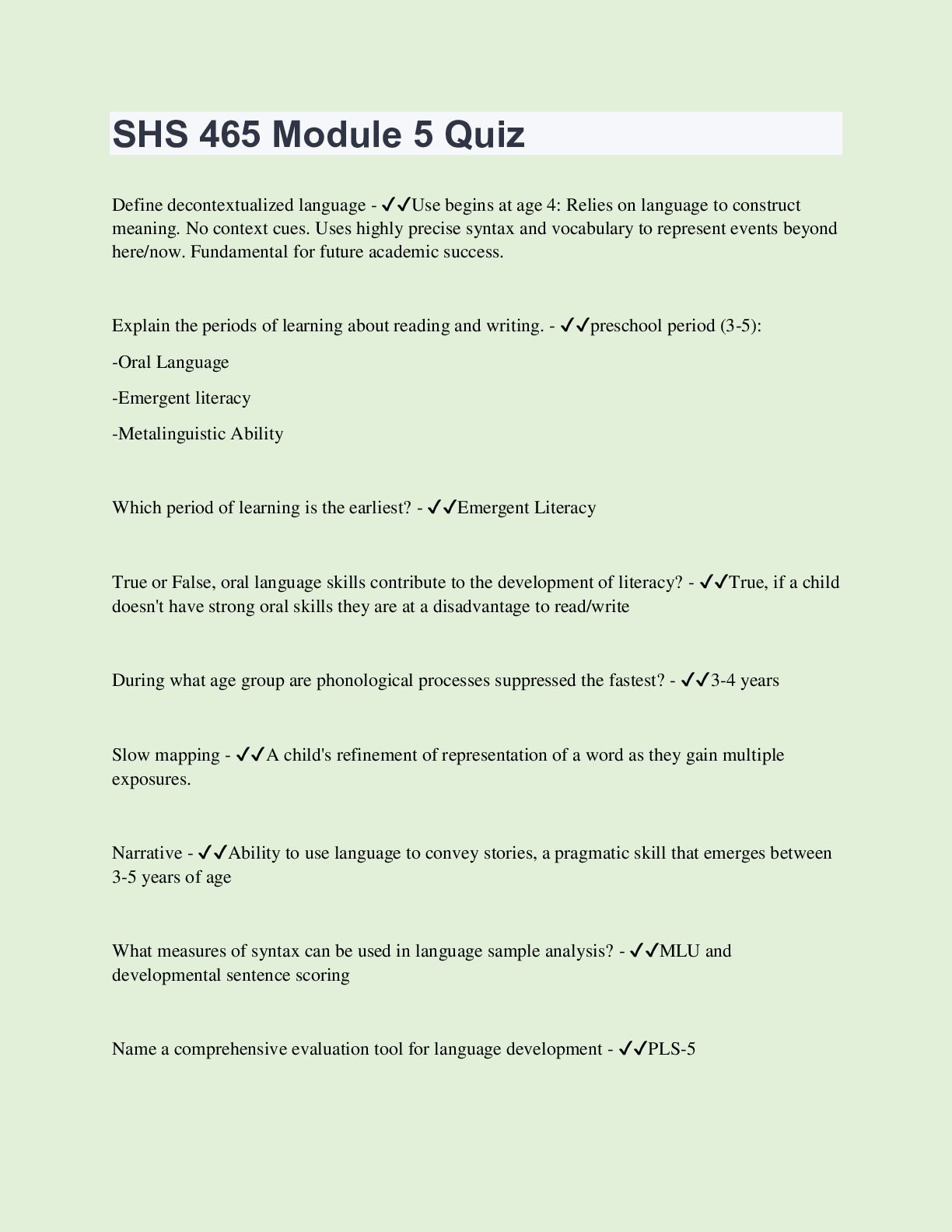Government > Quiz > GOVT 220 Quiz 1 Week 5 Module 5 Quiz: Congress|Questions and Answers|2025-2026 Update 100% Correct. (All)
GOVT 220 Quiz 1 Week 5 Module 5 Quiz: Congress|Questions and Answers|2025-2026 Update 100% Correct.
Document Content and Description Below
Quiz: Congress • Covers the Chapter 13 material from Module 5: Week 5. Question 1 1 / 1 pts What is pork-barrel legislation? Bills that have some tangible benefits to specific constituents but ... do not tackle broader, more controversial issues Agricultural bills that regulate farming The most salient issues on the agenda Legislation that is often controversial and difficult to pass Legislation that commemorates but does not involve action Question 2 1 / 1 pts The division of Congress into two separate bodies is known as which of the following? Cameralism Bicameralism Unicameralism Checks and balances The separation of powers IncorrectQuestion 3 0 / 1 pts What is the principal work of Congress? Deliberation and debate Action and debate Representation and debate Deliberation and representation Wrong Answer Action and representation Question 4 1 / 1 pts After being reported by a committee but before being sent to the House floor, bills are sent to which committee to define the conditions under which the bill is to be considered by the House? The Appropriations Committee The Joint Committee The Select Committee The Ways and Means Committee The Rules Committee Question 5 1 / 1 pts Which of these describes a marginal or toss up district? Voters frequently change party affiliation. The constituency is made up largely of minority groups. Voters are not clear as to which candidate is the incumbent. Gerrymandering has produced a loose affiliation of interest groups. The winner in an election gets less than 55% of the vote. Question 6 1 / 1 pts Article I, Section 8 of the U.S. Constitution confers on Congress all but which of the following powers? The power to veto bills The power to collect taxes The power to declare war The power to establish courts The power to regulate commerce Question 7 1 / 1 pts Which of the following statements concerning term limits is incorrect? The movement to impose term limits was popular in the 1990s. The concept of term limits is popular among the public. Many states passed laws to limit the terms of members of Congress. Research has shown that term limits have little effect on who gets elected to office. The Supreme Court struck down state laws limiting the terms of members of state legislatures. Question 8 1 / 1 pts Who primarily serves as the day-to-day leader of the Senate? President pro tempore Majority leader Party whip Chairperson of the Policy Committee Chairperson of the Judiciary Committee Question 9 1 / 1 pts A discharge petition is used by the House to do what? Make revisions and additions to a bill before it is voted on Get a bill that is stalled in committee onto the floor Amend a bill that has already passed one house but not the other Override a presidential veto Amend a bill in a manner that will make it quite unpopular Question 10 1 / 1 pts Politically moderate Americans are which of the following? Able to get more out of Congress than extreme partisans Less active than ideological extremists, but not by much Overwhelmingly politically inactive Overwhelmingly politically active More likely to donate to candidates Question 11 1 / 1 pts A temporary legislative committee established for a limited time period and for a special purpose is known as which of the following? Joint committee Conference committee Standing committee Rules committee Select committee Question 12 1 / 1 pts What is one proposed explanation for why congressional seats have become less marginal? The growing strength of the party system makes it less likely for challengers to appeal to average voters. Incumbents can use their powers to get programs passed that benefit their districts and themselves. Incumbents are less likely than challengers to become associated with the “mess” in Washington. Changing demographics have made an increasing number of districts overwhelmingly Democratic or Republican. Incumbents are less ideological than challengers and link themselves with Congress as an institution. Question 13 1 / 1 pts Why was the Office of Compliance created to oversee the law, rather than have the president execute the law? The latter may have been unconstitutional. The leadership wanted to control the office itself. The president did not want the job. The former was cheaper. Congress wanted to avoid following the law. Question 14 1 / 1 pts Where is the substantive work of Congress conducted? On the House floor On the Senate floor In the caucuses In floor sessions in both houses In the committees in both houses Question 15 1 / 1 pts When the president is a Republican and the Senate is also controlled by Republicans, but the House of Representatives is controlled by Democrats, it demonstrates which of the following? Agenda setting Divided government A joint resolution A gerrymander A markup Question 16 1 / 1 pts The complexity of the procedure for enacting a law gives the advantage to which of these? The bill's party supporters The bill's opponents The bill's congressional sponsors The bill's supporters in the executive branch The bill's supporters in the media Question 17 1 / 1 pts An important domestic power of Congress includes which of the following? Spending and regulating commerce Establishing post offices and building new monuments Establishing the federal court system and selecting judges Coining money and using the concept of judicial review Establishing rules for selecting judges and borrowing money Question 18 1 / 1 pts Unlike in the House, the scheduling of legislation in the Senate is which of these? Controlled by the Rules Committee Initiated by means of a discharge petition Governed by closed rather than open rules Determined by the majority and minority leaders Controlled by the Vice President Question 19 1 / 1 pts In addition to formal powers, the Speaker of the House has which of these informal powers? The power to assign patronage jobs and office space The power to decide salaries for members of Congress The power to rule on motions on the floor The power to decide benefits for members of Congress The power to decide which members will be renominated in the next election cycle Question 20 1 / 1 pts An important foreign policy power given to Congress includes which of the following? Borrowing money from other countries Declaring war Punishing piracy on the high seas Raising an army Summoning and regulating state militias Question 21 1 / 1 pts Which article of the U.S. Constitution details the structure and power of Congress? Article I Article II Article III Article IV Article V Question 22 1 / 1 pts The seniority system provides which of the following? Members are awarded additional committee assignments in line with their seniority. The committee member of the majority party with the longest continuous service normally becomes the committee chairperson. Members become party whips in order of seniority. Members of the House can be appointed to the Senate to fill vacancies. The Speaker of the House is the member of the majority party with the longest continuous service. Question 23 1 / 1 pts Since the 1980s, why has the conservative coalition become less important? Reapportionment has given moderates an advantage in policy making. Rules changes have weakened party discipline. Congressional leadership changes hands more frequently. Many Southern Democrats in Congress have been replaced by Southern Republicans. Northern Republicans are more influential. Question 24 1 / 1 pts The drawing of legislative district boundaries to give one side an advantage is known as which of the following? Madison ploy Apportionment Redistricting Reapportionment Gerrymandering Question 25 1 / 1 pts The explanation for congressional voting behavior that assumes members vote to please their colleagues is referred to as what? Representational Conventional Organizational Attitudinal Relational Question 26 1 / 1 pts Which of the following best describes the typical member of Congress? Middle-aged, white, Protestant businessman Older, white, Protestant businessman Older, white, Catholic lawyer Middle-aged, white, Protestant lawyer Young, white, communications major Question 27 1 / 1 pts Under the original U.S. Constitution, members of the House, unlike members of the Senate, were selected in what way? By direct elections By the president By state legislatures By primary runoffs By the electoral college Question 28 1 / 1 pts In the Senate, how many votes are necessary to invoke cloture and end debate on a bill? A simple majority 67 75 50 60 Question 29 1 / 1 pts In the absence of the president of the Senate, who presides over the Senate? The Senate majority leader The Senate majority whip The president pro tempore of the Senate The vice president of the United States The Speaker of the House Question 30 1 / 1 pts How many members are in the U.S. House of Representatives? 400 435 535 100 200 Quiz Score: 29 out of 30 [Show More]
Last updated: 3 weeks ago
Preview 4 out of 13 pages

Loading document previews ...
Buy this document to get the full access instantly
Instant Download Access after purchase
Buy NowInstant download
We Accept:

Reviews( 0 )
$1.00
Can't find what you want? Try our AI powered Search
Document information
Connected school, study & course
About the document
Uploaded On
Jul 07, 2025
Number of pages
13
Written in
Additional information
This document has been written for:
Uploaded
Jul 07, 2025
Downloads
0
Views
8
